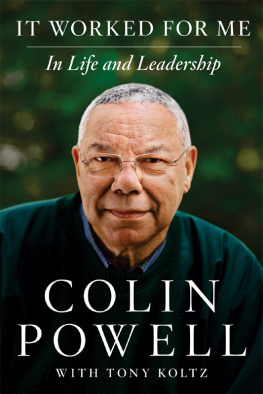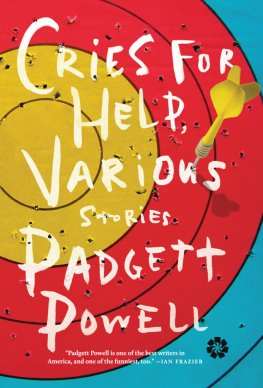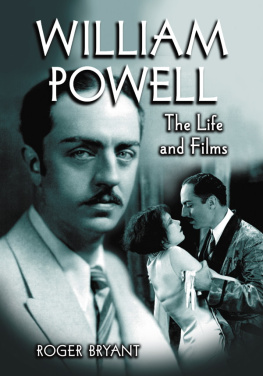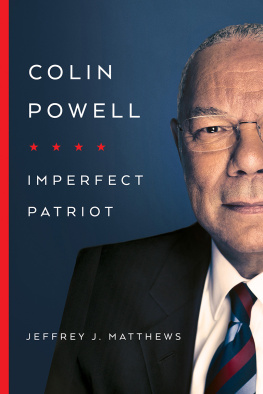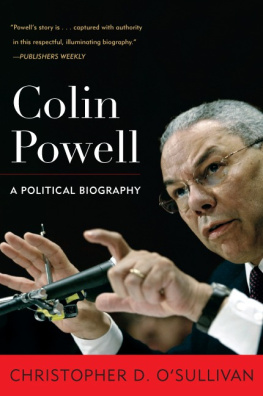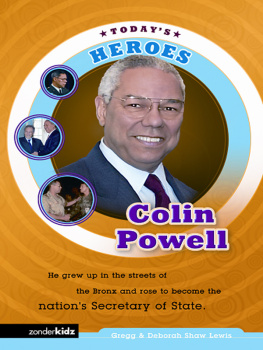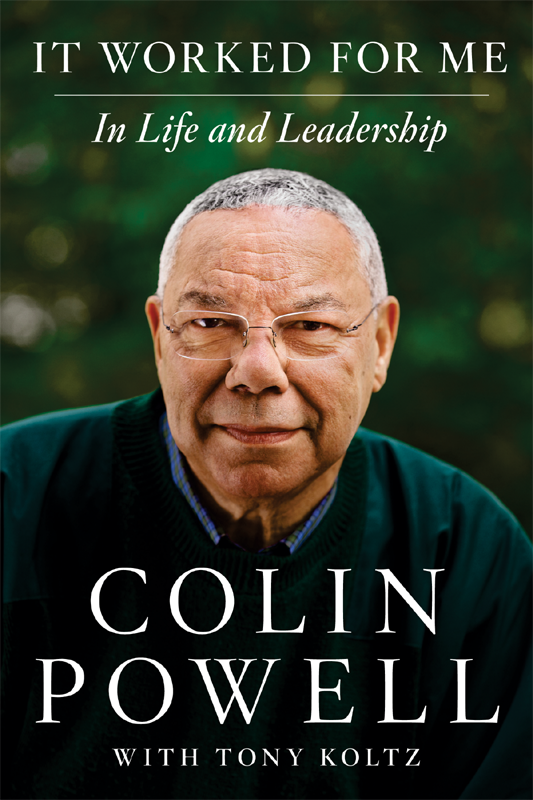
T O
J EFFREY , B RYAN , A BBY, AND PJ
O UR FUTURE
I love stories. In the course of my career, I gathered a number of them that mean a lot to me. Most come from my military life. I was in the military from age seventeen, as an ROTC cadet, until I was a retired GI at age fifty-six. Others came from my service as Secretary of State or National Security Advisor. Yet others came to me as I just wandered through life. In this book I want to share with you a selection of these stories and experiences that have stayed with me over the years; each one of them taught me something important about life and leadership. I offer them to you for whatever use you may wish to make of them.
Part I explains my Thirteen Rules, which have been bouncing around since they were first published in Parade magazine over twenty years ago. Part II focuses on the importance of really knowing who you are and how to always be yourself. The emphasis in Part III is on knowing and taking care of others, especially those who are your followers. Part IV captures my experience in the exploding digital realm that has reshaped the world and our lives. Part V deals with how to be a great manager and a great leader. Part VI, Reflections, describes serious and amusing aspects of my life. The afterword summarizes what the whole book is aboutpeople in all their glorious, loving, and frustrating forms.
As you will see, there are no conclusions or recommendations, just my observations. The chapters are freestanding. You can read them straight through or jump in anywhere. Everyone has life lessons and stories. These are mine. All I can say is that they worked for me.
Colin Powell
Contents
P resident George H. W. Bush was sworn in to succeed President Ronald Reagan on January 20, 1989. The moment he took the oath I ceased to be the National Security Advisor; the torch was passed to my longtime colleague and mentor, General Brent Scowcroft.
After I left the White House, I returned to the Army. In April I was promoted to four-star general and given command of the Armys Forces Command (FORSCOM), with headquarters at Fort McPherson, Georgia, just outside Atlanta. I had command of all the deployable Army forces in the United States, including the Army Reserve, and I supervised the training of the Army National Guard. I was the first black Army officer to have a four-star troop command.
Shortly after I arrived at FORSCOM, Parade magazine, the long-running Sunday supplement with a readership of more than fifty million people, asked to do a cover story about me and my new assignmentone of those short personal articles aimed at Americans reading their Sunday newspapers over coffee. Since the story was written and the supplement printed many weeks before its August 13 distribution date, Parade had no way of knowing that the 13th would be just three days after I was announced by President Bush to be the next Chairman of the Joint Chiefs of Staff. The article was so timely that I was not able to persuade everyone that its publication date was a coincidence.
Its author, David Wallechinsky, a highly skilled journalist, needed a hook to close the piece. One of my secretaries, Sergeant Cammie Brown, urged him to ask me about the couple of dozen snippets of paper shoved under the glass cover on my desktopquotes and aphorisms that I had collected or made up over the years. David called and asked if I would read off a few. The thirteen I read him appeared in a sidebar in the article.
After they were first printed in Parade to my great surprisethe Thirteen Rules caught on. Over the past twenty-three years, my assistants have given out hundreds of copies of that list in many different forms; they have been PowerPointed and flashed around the world on the Internet.
Here are my rules and the reasons I have hung on to them.
1. IT AINT AS BAD AS YOU THINK. IT WILL LOOK BETTER IN THE MORNING.
Well, maybe it will, maybe it wont. This rule reflects an attitude and not a prediction. I have always tried to keep my confidence and optimism up, no matter how difficult the situation. A good nights rest and the passage of just eight hours will usually reduce the infection. Leaving the office at night with a winning attitude affects more than you alone; it also conveys that attitude to your followers. It strengthens their resolve to believe we can solve any problem.
At the Infantry School, they drilled into us constantly that an infantry officer can do anything. No challenge is too great for us, no difficulty we cannot overcome. Think back to Churchill telling the world that Britain will never, never, never give up. Or more colloquially, Dont let the bastards get you down.
Things will get better. You will make them get better. We graduated believing that, and I continue to believe that, despite frequent evidence to the contrary.
A variation of this theme was also drilled into us: Lieutenant, you may be starving, but you must never show hunger; you always eat last. You may be freezing or near heat exhaustion, but you must never show that you are cold or hot. You may be terrified, but you must never show fear. You are the leader and the troops will reflect your emotions. They must believe that no matter how bad things look, you can make them better.
I love old movies and get from them lots of examples that I use for personal reinforcement.
The classic movie The Hustler opens with one of my all-time favorite scenes. Its set in a New York pool hall. A young pool whiz, Eddie Felson, played by Paul Newman, has come to challenge the reigning master, Minnesota Fats, played by Jackie Gleason. Also present are the pool impresario, Bert Gordon, a Mephistophelean figure played by George C. Scott, and a handful of spectators.
The match begins, and it is clear that Fast Eddie Felson is very goodmaybe great. He proceeds to get the edge on Minnesota Fats, game after game, long into the evening. Fats starts to sweat. Others gather around to watch. Fast Eddie and his manager begin to smell triumph. The king is about to die; long live the new king. Fats, ready to give up, looks over to Bert for relief from the misery. Bert simply says, Stay with this kid, hes a loser. Bert is a gambler and detects a weakness in Fast Eddie, an overconfidence that can be taken advantage of. Fats still seems stricken. He excuses himself and goes into the restroom. After washing his hands and face he comes out, seeming ready to leave. He signals to the attendant, and Fast Eddie smiles in victory, thinking Fats is asking for his coat. But no, Fats extends his hands for the attendant to apply talcum powder. Then, with a catlike smile he says, Fast Eddie, lets play some pool. You know the resthe crushes Eddie.
Many times when facing a tough meeting, an unpleasant encounter, a hostile press conference, or a vicious congressional hearing, the last thing I would do beforehand was go into the restroom, wash and dry my hands and face, look into the mirror, and say softly to myself, Fast Eddie, lets play some pool. I may be down, but never out. An infantry officer can do anything.
Oh, full disclosure: Paul Newman is the star. At the end of the movie there is a rematch and he beats Fats. I never watch that scene.
2. GET MAD, THEN GET OVER IT.
Everyone gets mad. It is a natural and healthy emotion. You get mad at your kids, your spouse, your best friends, your opponents. My experience is that staying mad isnt useful. That experience was tested by my colleague the French foreign minister Dominique de Villepin, who made meand most Americansmad, very mad.
Dominique was a career diplomat, a graduate of the most prestigious French national academies, a noted historian, and a gifted poet, and he was very close to the then president of France, Jacques Chirac. With his flowing silvering hair and impeccable suits and ties, he cut quite a figure.
Next page
